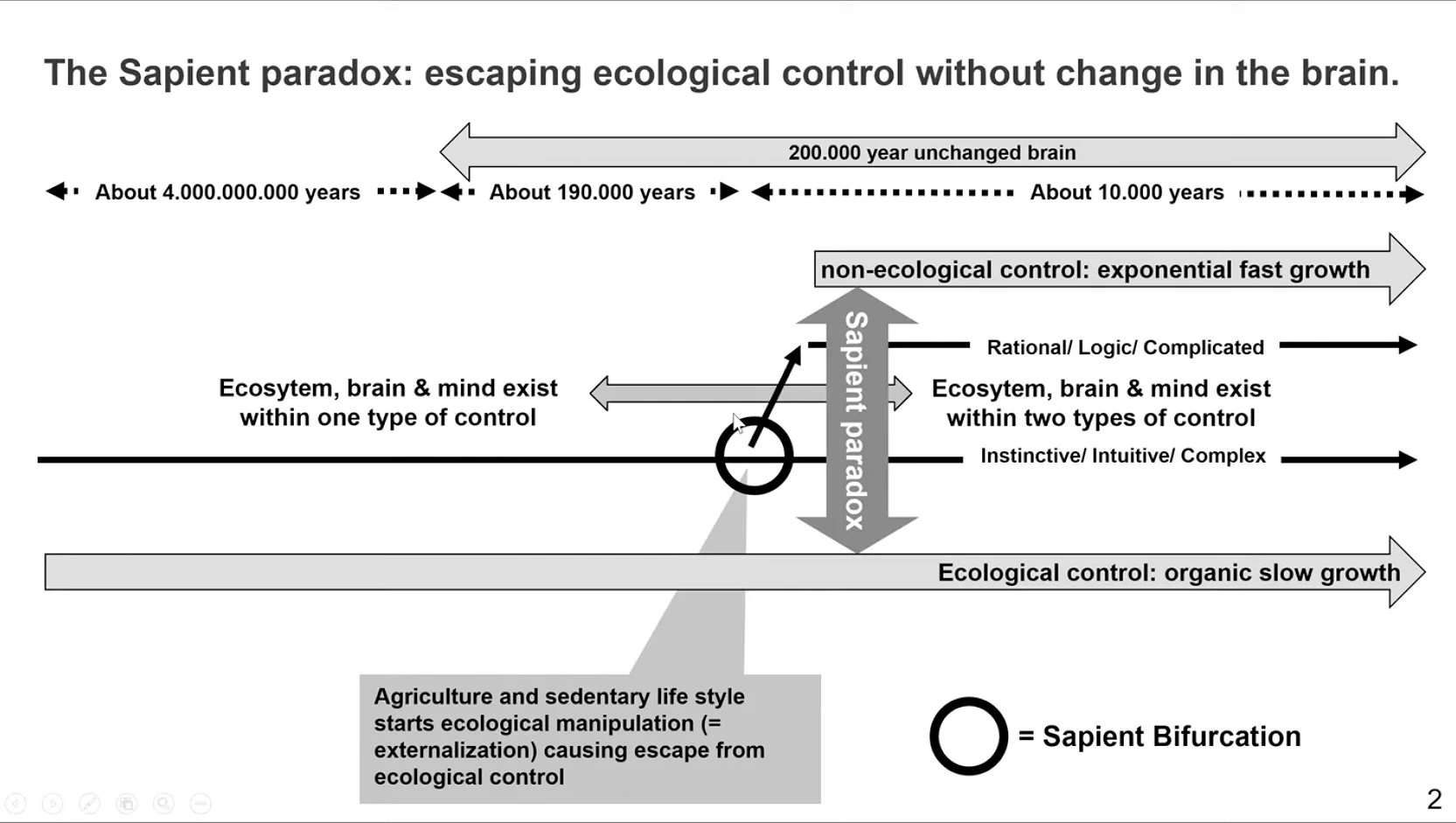
My presentation intends to illustrate one different view on the cybernetical history of humankind that is emerging in the natural sciences, not to assume any answer but to inspire more exploratory questions.
Why did humankind create such a moral and ecological mess of this world, and why have we done that for only about 10,000 years? This question might be related to the Sapient Paradox, which emerged after decades of archeological and neurophysiological research (Donald, 2009; Iriki, Suzuki, Tanaka, Bretas Vieira, & Yamazaki, 2021; Renfrew, 1996, 2007, 2008a, 2008b; Renfrew, Frith, & Malafouris, 2009; van der Leeuw, Lane, & Read, 2009).
As we know it today, the human brain has been in its actual shape for at least about 60,000 years and probably much longer. Still, the explosion of human development and rational thinking only happened at the beginning of the Neolithic period, about 10,000 years ago, just a fraction of the 3.7 billion years of life on Earth.
This “explosion of human development” happened without any change in the brain.
During these 3.7 billion years, evolution developed the complexity of life as we observe it today. Until 10,000 years ago, the complete diversity and interactions of living forms were part of a self-organizing, ecologically controlled system.
The rhythms of life cycles of birth, growth, and death kept the system surviving and becoming more complex during evolution. From our modern human perspective, it took millions of years for this process to see a recognizable change. We are used to calling this “slow.” The human brain was no exception, inspiring Renfrew in 1966 to ask: “What created the modern mind without changing the brain’s anatomy? The human brain today is not different from 60,000 years ago, but the behavior is.
The short answer is that humankind started becoming sedentary, externalizing its behavior (= non-ecological manipulation of an ecosystem), disconnecting from the rhythm of nature, and escaping ecological control, causing an exponential process with a speed of change never seen before in 3.7 billion years.
The consequences of this ecological dislodgment might have been the cause of the derailment from the ecological order, allowing both so-called human advances and an ecological and cognitive mess in this world to emerge. For a species to survive in evolution, it needed to have enough complexity to match the complexity in the environment.
To match a complex system, one needs to be as smart as the system, maybe a little bit smarter, but not much. Evolution doesn’t waste energy being smart without a purpose. Ashby’s law of requisite variety is the scientific version of this principle. Combined with the law of least action, it also means that the brain could only evolve as brilliantly as the environmental ecosystem but never much brighter.
Without any option to change the brain and its integration within the ecological environment, derailment might have been the only way to escape ecological control and grow as fast as humankind did without becoming smarter.
The cause of today’s moral and ecological mess might be the same that created all human progress. Another related paradox is that the advances of the last 10,000 years might not be caused by human beings being smarter than nature but, in reality, being more stupid. Being less smart than nature might have been, and still might be, a fundamental condition for escaping ecological control and creating a non-ecological exponential development speed.
Speaker Bio
Peter Robertson focuses on decision-maker dynamics in business transformation. He has over 30 years of experience as an international corporate adviser at KPMG (Amsterdam) and Human Insight (London) and as an executive lecturer and associate professor at universities in the Netherlands, China, and the USA.
Peter developed an organization-ecological assessment suite of tools, available in sixteen languages, based on the work of Nobel laureates Lorenz and Tinbergen. He is the author of “Always Change a Winning Team,” which describes the early development and history of the organization-ecological approach.
Peter works primarily with boardrooms, executives, and senior teams of high-tech, telecom, financial industry, and medical technology firms. This includes large corporates and startups located in Europe and the USA.
Peter teaches at the Nyenrode Business University in the Netherlands and is an associate of Change Logic, Boston, USA. His focus isorganization-ecology, culture-independent ways of cooperation, and life-cycle dynamics.
He is a member of the International Society of Systems Sciences and the American Society of Cybernetics. Before building his career in corporate life, Peter studied medicine and worked in immunology at the University of Amsterdam and the Mayo Clinic (Rochester, Minnesota). He later specialized as a psychiatrist-psychotherapist, with a sub-specialization in neurology.
